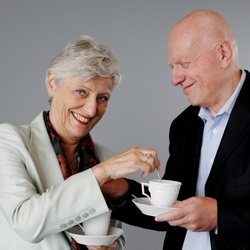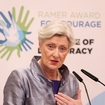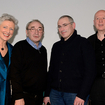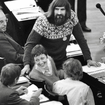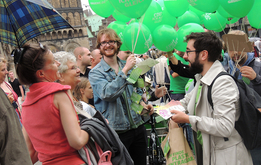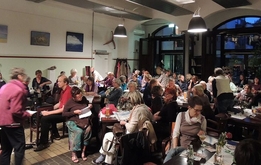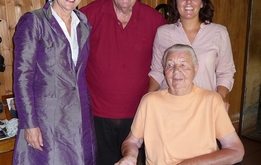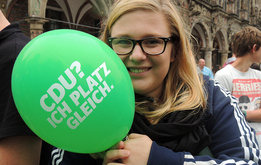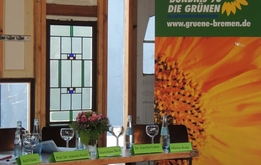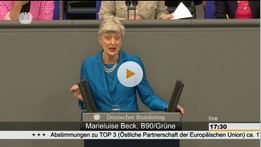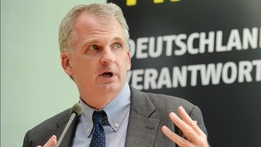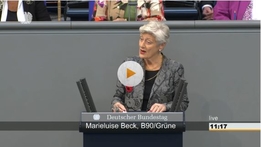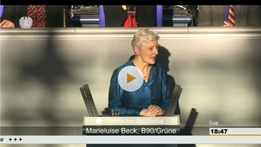Interview with a political couple: Marieluise Beck and Ralf Fücks agree that Ukraine and dealings with Vladimir Putin are becoming a litmus test for free Europe. By Richard Herzinger and Andrea Seibel
For more than 30 years they have been a couple as well as political partners. Marieluise Beck is the longest-serving Green in the Bundestag, while Ralf Fücks co-chairs the Green political foundation, the Heinrich-Böll-Stiftung. They have two children – “Just two”, says Marieluise Beck, who comes from a large family.
He was the only child of working-class parents in Edenkoben, who bought an ‘aryanised’ house and subsequently opened a shoe shop after the war. It is not surprising to learn that he followed the anti-Establishment call.
She studied in Heidelberg, living in shared accommodation with a group of political activists who tried to lead her along the right path. Her ambition, however, was to be middle class, to have a flat with net curtains and to marry, and so she slipped away from that scene.
It took him to read Arthur Koestler – The Yogi and the Commissar – to rid himself of all his past baggage. Both he and she are so independent that they are lone wolves in Green circles.
Die Welt: You both travel a lot. You, Ms Beck, have just been in Bosnia, and you Mr Fücks, in the United States. What have you brought back?
Ralf Fücks: I was in Washington. Many of the conversations I had there revolved around German policy towards Ukraine and Russia. There was certainly some irritation about our opinion polls indicating that a majority of Germans tend to favour a position of neutrality. Nevertheless, in America too we see a mood of retreat. This is a reflex reaction to the bloody nose that the US has received in Iraq. Afghanistan is not really regarded as a success either, and chaos is looming in Libya. There is growing self-doubt in the United States, and people are having qualms about military interventions. Barack Obama is only expressing a widespread mood. The US is reaching its political and financial limits. What that means for us has not even been registered here.
Die Welt: But what is wrong with exercising restraint in the face of explosive conflicts or indeed keeping out of them?
Fücks: We can try to ignore the conflicts in the world, but they will not ignore us, especially if they are waged in our eastern neighbourhood or in the Arab world. It is not just a matter of direct security interests. It is about international law and order. In other words, do we relapse into an age of violence and chaos in which the law of the jungle prevails, or do we ensure that democracy and international law are established as guiding principles and so create a peaceful and cooperative environment for Europe?
Marieluise Beck: I am experiencing a kind of historical déja vu at the present time. The passive attitude of the West to Russia reminds me of the response to Serbian aggression in Bosnia twenty years ago. At that time we were similarly unable to anticipate developments and kept our eyes closed for too long to unpalatable truths. Even today, people in Bosnia cannot understand how that war could possibly have broken out. They will tell you of their previous good and peaceful coexistence. Where did all the ethnic hatred suddenly come from? As in Bosnia in those days, it is also being forcibly imported into Ukraine today. Then it was brought by Serbian paramilitaries; today it is brought by their Russian counterparts.
Fücks: If the Federal Government were to say clearly that what is happening in Ukraine amounts to covert Russian military intervention, it could no longer keep putting off the introduction of the ominous third round of sanctions. Because of reluctance to reach this conclusion and fear of its consequences, all we hear are vague appeals to all parties not to escalate the conflict instead of some straight talking.
Die Welt: But has Russia not taken us unawares, even more so than Serbia back then? After all, in the West we regarded Russia as our ‘strategic partner’. Besides, there is a great deal of explicit sympathy for Putin here, which Slobodan Milošević did not enjoy in those days.
Beck: There was some degree of sympathy for Milošević too. Social Democrats on the left of their party had a great deal of sympathy for the Yugoslav Communists and were unwilling to accept that Milošević, a former Communist Party man, had become a tribal nationalist. Other intellectuals took Serbia’s side because of the crimes committed there by the Wehrmacht during the Second World War. The same reflex is encountered today in people who equate criticism of Putin with a Cold War mentality. And yet it is Vladimir Putin who has been engineering a gradual return to confrontation. It began with the switch to more authoritarian domestic policies. First of all, heavy pressure was exerted on those who were engaged in objective historical analysis of Stalinism, because that was an undesirable activity. On the contrary, the Russian power elite has been spreading the myth that Stalin acted only to defend himself against a world full of enemies. The same logic is now being applied to suggest the presence of a fascist threat in Ukraine. In this way the aggression against Ukraine can be presented as a continuation of the Great Patriotic War, a message that is dinned into the Russian population from morn till night.
Die Welt: What, in your opinion, has Russia been doing in this direction?
Fücks: The undigested loss of the Soviet Empire is a powerful psychological driving force; Russia is still pining for its former superpower status. We should sit up and listen when President Putin describes the disintegration of the Soviet Union as the greatest geopolitical disaster of the last century. That is fertile soil for the return of Greater Russian nationalism, for willingness to use force to reverse the course of history. When Putin speaks of south-eastern Ukraine as New Russia, he is harking back to the era of Tsarist imperialism. A second factor is the failed effort to modernise the economy, with power politics being used as a substitute for a lack of innovative capacity.
Die Welt: Not too many people in Germany see things as unequivocally as you do. There is, for example, the effect of a selective German anti-fascism, which says that we must tread cautiously with Putin because Germany invaded Russia 70 years ago. Yet in actual fact Germany …
Fücks: ... invaded the Soviet Union. The legitimate historically rooted diffidence towards Russia is clearly not felt towards Ukraine. Many a leading intellectual has even swallowed the legend that Ukraine is merely an artificial construct. One factor here is surely a certain fascination with Russia that is deeply ingrained in Germany’s cultural and political history – the notion of a German-Russian affinity, expressed in a common rejection of capitalist modernism, especially the Anglo-American version of capitalism.
Beck: This awareness of German guilt has also given rise to a reluctance to make an issue of the crimes committed by the second totalitarian system in those areas. Who in Germany knows anything about the starvation of millions of peasant farmers in Ukraine in the early 1930s, and who is familiar with the Nazi-Soviet Pact of 1939? Who is aware that, having been invaded by Germany on 1 September 1939, Poland was then invaded by the Red Army on 17 September? German guilt has deterred us from fully engaging with this history.
Die Welt: We journalists are bombarded with appeals from many readers who say it is high time we stopped our constant criticism of Putin, because it could trigger a war. What would you say to them?
Fücks: We cannot let fear blind us to the fact that Russia is using military force against Ukraine and trampling international agreements under foot. What I find very annoying about the German debate is the lack of empathy with Ukraine, a country that has set out on a journey towards the European Union. Why do so many people refuse to acknowledge that a great democratic awakening has begun there – in spite of the nasty elements that are washed to the surface in the course of any revolution? We also saw a comparable lack of empathy and sympathy with Solidarność in Poland in the 1980s.
Die Welt: Yet in the European election campaign, to put it rather starkly, the Greens focused more sharply on the threat from poultry processed with chlorine than on the threat to freedom and peace in Europe from Putin’s authoritarianism.
Beck: If any party has a clear position on the conflict in Ukraine, it is the Greens. The same applies to our solidarity with the Russian civic movement. But I want to make a different point here. In the debate at that time about intervention in Bosnia, the writer Peter Schneider raised an important question: if the post-1968 generation presents pacifism as the only ethically acceptable consequence of National Socialism, he asked, do they not thereby deny the legitimacy of the Allies’ fight against German aggression and so indirectly put themselves on the side of their own criminal fathers? I always have to weigh this question in the balance today when I consider the widespread vehement rejection of NATO and the United States. We are full of understanding for Putin’s use of force as a political instrument but are very quick to condemn ‘American imperialism’. This anti-American sentiment is to be found across a wide spectrum from Oskar Lafontaine to Peter Gauweiler.
Die Welt: How do you explain that this anti-Western sentiment has now reached the centre ground and is no longer the preserve of left- and right-wing radicals – who are uncannily united, incidentally, in their solidarity with Putin? What has happened there in Germany?
Beck: This ‘anti’ sentiment has always essentially been there. I believe that capitalism is something which is instinctively rejected in this country, because we primarily seek equality and security. In our everyday lives, we do exceptionally well out of this market economic system, yet there are deep-seated aversions to it. It is significant that Nazi ideology was able to tap into the concept of socialism, which it primed with antagonism towards Anglo-American capitalism and particularly towards the Jews, whom it equated with high finance. The antipathy towards international financial capital, plutocracy, Wall Street and all these elements is still present in our society.
Die Welt: Some years ago, in a book entitled Der lange Weg nach Westen (‘The long road westward’), historian Heinrich August Winkler concluded that this journey had finally been completed. Was he too hasty?
Beck: Yes, I do believe so, for the long threads from the dark side of German history reach further than we thought.
Fücks: Although we are talking about a thoroughly ambivalent relationship here. In fact, Germany today is culturally far more ‘Western’, open, pluralist and free than at any time in its history. The United States is demonised, yet at the same time we keep importing the latest trends from there, from the gender debate to Facebook and Twitter. Conversely, for all the sentimentality about Russia, most Germans do not regard the Kremlin as a trustworthy power base. Swapping the North Atlantic Alliance for a Eurasian Union with Russia is not an idea with majority appeal.
Die Welt: You are criticised in various quarters for painting an excessively black and white picture of conflicts like the one in Ukraine, based on a moralising stance on human rights.
Fücks: We are not out to idealise one side. Ukraine has a host of problems, ranging from a corrupt political elite to the power of the oligarchs. But being critical does not mean staying neutral if a country is attacked when it has just begun to reinvent itself.
Die Welt: But surely it is obvious that the reason why many refrain from taking sides is that they fear armed hostilities with Russia.
Fücks: That fear, of course, is not unfounded. Now that the notion of a partnership for modernisation has proved to be an illusion, we are once more in a conflict situation with Russia and must answer the following question: how we are to define the relationship between limited conflict and limited cooperation in future? We need both a cool head to avoid sliding into a military confrontation and a resolute response to Putin’s revisionist policies. Sidestepping the issue will only encourage Russia to continue on its imperialist course.
Beck: People must be told clearly that Russia is our antagonist at the present moment and not our partner. Nevertheless, our diplomatic exchanges must be maintained. But sanctions are also part of the diplomatic toolkit. Russia is once more adopting the posture of a military power. We must counteract that with our economic weapons. Anyone who wants a political solution to the conflict in Ukraine has to make it clear to the Russian leaders that there is a high price to be paid for using military force to carve up the country.
Die Welt: Has Putin had a long-standing plan to mount this aggression in Ukraine?
Fücks: It is certainly the case that Russia has vastly increased its military budget in recent years. Special units were established for the very type of irregular warfare that we are now seeing in Ukraine. The seizure of the Crimea was perfectly choreographed too. This script was not written on the spur of the moment.
Die Welt: Yet the US military budget has been pared down. Could it be that our Western democracies are already too weak to stand up to anyone who hungers for power like Putin?
Beck: We live in a ‘post-heroic’ society that abhors war and relies on the possibility of resolving all conflicts through dialogue and compromise. That applies especially to Germany. Think how people are increasingly at a loss to understand Israel, to comprehend how Israeli citizens can say they are prepared to defend themselves against the enemies who seek to destroy them. The problem is that the Russian leaders do not apply our logic of conflict avoidance. They are prepared to use force and assume that the West will not make any serious attempt to stop them. We are not ready to deal with that.
Fücks: German policy has been based on the assumption that the events of 1989 and 1990 heralded a new age of democracy and peace. This dream has now been shattered. Instead of democracy becoming globalised, the tide is tending to turn back towards authoritarianism and militarist power politics. The new systemic rivalry is between democratic societies and authoritarian regimes.
Beck: Following the European elections, I also sense for the first time that Europe is under threat from within – through a lack of identification with the European integration project and no doubt because of the mistakes that were made in response to the financial crisis too. Instead of closer union we are now seeing deep political and social fault lines in Europe. If internal cohesion crumbles, it becomes impossible to present a united front to the rest of the world. The fact that the European Right is now allying itself with Putin against the EU should set alarm bells ringing.
Fücks: The Ukraine crisis is also testing the ability of the EU to assert itself as a developing political entity. Are we prepared to stand up for European values in uncomfortable situations? It would be a monumental error if we responded to the successes of anti-EU factions in the European elections by accommodating them instead of resolutely pressing ahead with the political unification of Europe, particularly in the fields of foreign and security policy and a common energy policy. The question is whether we can still summon up the necessary creative motivation.
Beck: This also has something to do with the shortcomings of democracy and our own disposition. Many of our Eastern European friends look at us in puzzlement and say they wish they only had our problems. They include the Ukrainians, who recently queued in the heat for four hours to elect their President; meanwhile, more and more people here claim there is no point in voting because the people at the top are all corrupt anyway …
Die Welt: ... and so they let in the extremists, whereas the Ukrainians, so long suspected of ‘fascism’, consigned the right-wing radical candidates to oblivion with an aggregate total of less than two per cent of the vote.
Fücks: You are hinting there at a deeper-seated problem, namely the fact that we are losing our ability to distinguish between democracy and authoritarianism. In many debates on Ukraine we encounter the argument that the United States is actually even worse than Putin’s Russia. We do not seek to excuse all of the aberrations and misdeeds of the United States. The point is that we must be able to differentiate between a fallible democracy and an authoritarian regime.
Die Welt: Which brings us back to the earlier question: why did the Greens not contest the election on the key issue of freedom and peace in Europe? Are you so isolated within the Greens, or is it because freedom and peace would not have been vote-winners?
Beck: I would certainly not call it isolation. There are many in the party with similar views on Ukraine and Russia. But no amount of discussion can change the fact that these views differ from the original consensus on which the Greens were founded. In 1983, we had a programme that called for the dissolution of NATO. Those who still advocate an anti-NATO stance today can invoke that original programme. The Greens also come under pressure from the Left Party, which is revitalising anti-Western attitudes.
Fücks: It depends very much on the position from which the surveillance methods of the NSA or the negotiation of the Free Trade Agreement are criticised – whether the underlying aim is to defend shared values or to terminate the transatlantic alliance.
Die Welt: You have both moved a long way together from the original Green positions. So what binds you as political and intellectual soulmates?
Beck: I believe it is the attempt to live with binding values but without ideology.
Fücks: We draw much of our commitment from the history of Germany and Europe in the last century. That is the source of a strongly anti-totalitarian impetus that unites us. It is, to quote Hannah Arendt, freedom as the purpose of politics. In my case, because I once belonged to one of the neo-Communist ‘K’ groups that were founded in the wake of the student revolts, this impetus is also derived from the disruptions in my own political biography. In addition, we experience a great many things and never run out of subjects to discuss with each other.
Kategorie:
Thema:
